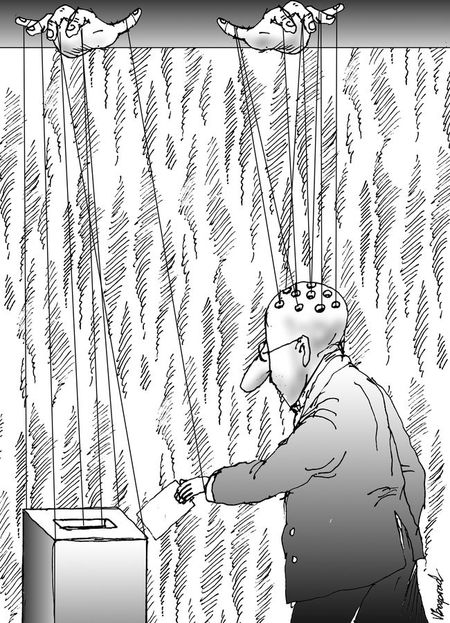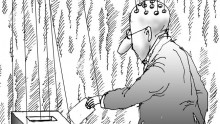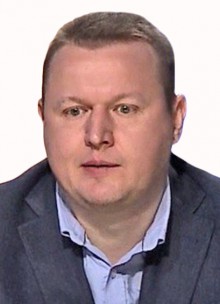The coming presidential race is a little less than a year away. However, an active re-grouping of forces and candidates’ preparations have already begun. We talked about the special features of the coming election with head of the department of electoral technologies at the Situation Modeling Agency Valerii Honcharuk.
How would you characterize the main players, major candidates before the election of a new president?
“The presidential election will definitely determine the nature of the subsequent parliamentary election that will take place in the fall of 2019. I think, therefore, that the main political forces (both those represented and unrepresented in parliament) will nominate their candidates. However, current candidate support figures are not yet indicative, so they only testify to the fact that there are no obvious favorite or favorites so far. Yulia Tymoshenko and Petro Poroshenko lead in all opinion polls, but their support is still so low that any third-party candidate can get into the second round. It should also be noted that both Tymoshenko and Poroshenko have high disapproval figures, so anyone who gets into the second round can defeat either of the two, theoretically speaking.
“Of course, a very serious game has already begun regarding selecting a partner for the second round of voting, which suggests the possibility of a third-party candidate emerging. Therefore, it is not surprising that we can see in recent opinion polls names which are rather problematic in terms of politics, like those of Sviatoslav Vakarchuk or even Volodymyr Zelenskyi. It shows that the niche is there, the more so that a lot of the electorate are still undecided.
“I think the main players who are represented in parliament will act cautiously. The People’s Front behavior is indicative here, as they say through Arsen Avakov that they have not decided who they will support in the election: maybe they will nominate their own candidate, maybe they will support the current president, or maybe they will nominate a third, alternative candidate. Therefore, bargaining is just beginning.
“In addition, we see that in the government itself, too, not everything is running smoothly. For example, there are conflicts at the level of law enforcement, anti-corruption agencies, including one between Yurii Lutsenko, Artem Sytnyk, and Nazar Kholodnytskyi. On the other hand, some people say that Volodymyr Hroisman’s term in his position is not infinite either, hence, some kind of a squabble takes place around it too. Also, the election will necessarily be affected by the situation in eastern Ukraine, the possibility of an escalation, broader hostilities, etc. Of course, the economic situation in the country will be of great importance as well. Thus, it is unlikely that someone will come up with an accurate long-term forecast a year before the election.”
The Hroisman cabinet turned two years a few days ago, and people say increasingly frequently that its head has started charting an independent course a long time ago. Should one expect his participation in the election as a member of some alliance?
“For Hroisman, it is important to get key decisions passed at the level of parliament, so he enters situational alliances with various political players. Often we see that he is even more supported by the People’s Front than the Petro Poroshenko Bloc itself, which has a very complex composition. A third of its MPs are already openly declaring their opposition to the president. But I would not yet make any predictions as to whether Hroisman will be able to enter the presidential election as an independent player. After all, one must take into account the fact that he does not have strong support from any parliamentary force. Accordingly, in order to bid for something, he needs to go through another election race. At the same time, it seems to me that there are not enough votes at the moment to dismiss Hroisman. There will also not be enough votes for any new prime minister to be confirmed.”
You mentioned two “non-political” names: Vakarchuk and Zelenskyi. What are their chances of winning, and who might be their puppet master?
“Vakarchuk, unlike Zelenskyi, has some political experience. We know that he was once an Our Ukraine MP. But this was a negative experience, so he was unable to become a true legislator. I do not rule out that the part of the democratic camp that is opposed to the president will bet on Vakarchuk. But then the question arises: who are his team members? There may be problems here. For example, Viktor Pinchuk’s shadow may appear behind Vakarchuk, and that of Ihor Kolomoiskyi – behind Zelenskyi. In such circumstances, it will be difficult for Vakarchuk to conduct an election campaign.”

Sketch by Viktor BOGORAD
What are Oleh Liashko’s chances of winning?
“Liashko will try to play a game of his own and, of course, will run for president. And he can be assured of winning the fifth, fourth, or third place. If he will unexpectedly go through to the second round, then the vast majority of voters will vote not so much in support of his opponent, but rather against him. It is because Liashko is a rather extravagant and notorious figure who has his own voters, but this is not enough to win the election.”
Nationalist forces (Svoboda, the National Corps, the Right Sector...) held a joint march against the oligarchs recently. It is well-known that they have a niche, but is it enough to qualify for a major role in the election?
“I think that all these marches are rather more aimed at the parliamentary election. And here, one should also understand that nationalist forces have their own limited niche and support base. We know that in the last pre-revolutionary parliamentary election that was held under Viktor Yanukovych’s administration, Svoboda got 10.5 percent of the vote, while the next election, held soon after the Euromaidan, saw them failing to clear the electoral threshold, as they got just 4.7 percent. To be fair, they had competitors in 2014, like the Right Sector and others. If they unite before the next parliamentary election, then of course they will have a real chance to clear the threshold. As for the presidential election, the support for, say, Oleh Tiahnybok is lower than for the party itself, that is, it is far from being sufficient for victory. As for other leaders, such as Andrii Biletskyi, their support figures are even lower. In general, it is quite possible that key players will use nationalist forces in their games, because these groups are inherently active, mobile, can be aggressive, etc.”
Let us analyze the opposite camp now, namely former voters of the Party of Regions. Here, Yurii Boiko and Vadym Rabynovych are still contesting the leadership. How realistic are their chances?
“The phenomenon of the For Life Party, created by Rabynovych and Yevhen Muraiev, is similar to the Progressive Socialist Party of Ukraine, led by Natalia Vitrenko. Such a project can claim a certain portion of voters, not exceeding 10 percent: this is quite radical pro-Russian electorate. But they have absolutely no growth potential, given that their most ardent supporters are cut off in the occupied territory. For his part, Boiko relies on a more moderate section of the electorate, but this moderation may not actually benefit him, because such voters are more passive. Another problem of the Opposition Bloc is its disunity. I think that in the presidential election, Boiko will strive not for victory, but for a respectable result on the eve of the parliamentary election. In that latter race, he will be able to obtain a more solid result, which will open up the possibility of getting into a coalition and receiving certain ministerial posts.”
Last week, the media run a story about the oligarchs Ihor Kolomoiskyi and Hennadii Boholiubov secretly meeting in Geneva with ex-chief of the Presidential Administration Borys Lozhkin. “Of course, we discussed Ukrainian realities, politics, and prospects for the future, including the fact that Poroshenko will never win presidency again,” Kolomoiskyi stated later, as quoted by radiosvoboda.org. In your opinion, who and how do Ukrainian oligarchs manipulate before the coming election?
“There is no united oligarchic class in Ukraine, they are skeptical of each other, and therefore compete with each other. Accordingly, the oligarchs will not play in the same camp. It is clear that Kolomoiskyi will under no circumstances support Poroshenko, and will use his resources to help other players win. Meanwhile, Rinat Akhmetov or Pinchuk will be more likely to put eggs in multiple baskets. This is the long-established pattern of their behavior. Also, we must take into account that other oligarchs, like Yurii Kosiuk, Oleh Bakhmatiuk, or Kostiantyn Zhevaho have grown stronger as well, and they will play their own games too, because they have enough resources. The incumbent president is able to run a full-fledged election campaign too.”
Why, in your opinion, despite all the tragic events in Ukraine that ought to have changed the system, voters have to choose among the old guard again? Why is vertical mobility not working?
“Unfortunately, we have not had evolutionary change and renewal of the political elite. It seems that after the Euromaidan, many young people (public figures, war veterans, journalists...) entered parliament without too much political baggage, experience and responsibility, but they have not been able to show themselves as forces for good, and have failed to turn into full-fledged leaders or to introduce constructive projects. The system has absorbed them. Thus, yesterday’s ‘idols’ have discredited not only themselves, but also their ideas. So far, Tymoshenko and Poroshenko remain the main players out of this crop of candidates.”








